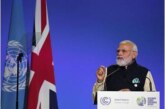
Dr Arvind Kumar, President, India Water Foundation, New Delhi.
New Year has dawned with most of the past legacies still persisting and new hopes taking roots. Eurasia Group, a New York-based political consultancy firm has recently released a forecast report listing top geopolitical risks for 2011. In this editorial, we attempt to present a summary of these top risks for the benefit of our readers.
G-Zero
G-Zero or a world without a clearly defined superpower is being perceived as at top of the geopolitical risk scale for 2011. This new political reality will intensify all other top risks for 2011, including the potential for an uncontained economic crisis in Europe, reluctance by China to respond to growing international pressure, and provocations from North Korea. Ian Bremmer, head of Eurasia Group, in a recent interview, said: “Now, we look at where the world is, and we realize it is in indeed a new world order in a dramatic way, in a way that when the Soviet Union collapsed it wasn’t a new world order. The Soviet Union’s [collapse] led to the G7+1, which was a speeding-up of globalization. There were some new countries to invest in, it was Europe getting stronger, but it was globalization that had been occurring — and it became faster.” With the G-Zero, geopolitics now challenges globalization in the absence of effective international leadership.
Europe
According to this report, 2011 will be a year of growing uncertainty for Europe. The eurozone will remain intact, but the risk will grow that the crisis will balloon into something unmanageable. The main problem is that the politics of austerity in the periphery is probably not sustainable, undermining the prospects for the “bailouts with tough conditionality” strategy to contain the crisis.
Cybersecurity
Cybersecurity is listed as another risk in the New Year by the report. The previous decade witnessed increasingly technologically-capable hackers and organized crime organizations having elevated cybersecurity as a business risk, but not as a political risk. The centralization of data networks, both in energy distribution (the move to the smart grid) and information technology more broadly (the shift to cloud computing) are “now metastasizing the cyber risk, and governments are becoming more directly and actively involved in playing both offense and defense in cyberspace. The primary involvement of states in cybersecurity, as both protagonists and principal targets, fundamentally changes the nature of the risk.”
China
Continuity in China’s growth story is likely to evoke some amount of resentment in the West, especially in the industrialized countries engaged in a sluggish global recovery and where unemployment remains high. One of the most important implications of the G-Zero is that the pattern of reasonably coordinated global responses to the financial crisis seen in 2009, but that broke down by the end of 2010, will not be put back together in 2011. China’s overt and covert support to North Korea and Iran is a point of concern for the US and its allies.
North Korea
According to Eurasia Group’s assessment, the North Korea is likely to take provocative steps against the south in 2011 despite reasonably strong pressure from China. In the context of growing US-China mistrust, the potential for the Korean peninsula spinning out of control is real. North Korea’s decision to keep pushing the South Koreans’ buttons is almost certainly the result of a faster-than-expected leadership transition in Pyongyang. That’s the only variable that could explain the sudden dramatic change in behavior. North Korea’s reluctance to abandon its nuclear weapons’ programme, its tense relationship with South Korea and Japan and internal power struggle within Pyongyang are some of the issues that may hog limelight in coming months.
Capital controls
It is further pointed out in the report that the risk is rising that many countries, including those that resisted the urge in 2010, will impose capital controls in 2011. This trend is driven by a combination of the divergence in economic recovery between emerging markets and industrialized countries and the increasingly dim prospects for a coordinated G20 strategy to tackle current account imbalances. The latter is perhaps the most significant immediate manifestation of the G-Zero, with strong incentives for unilateral responses and where the lack of global governance creates major market uncertainties.
US gridlock
Effective governance is generally considered good for emerging markets, where new policies are required to provide impetus to the process of growth. However, gridlock is a fine outcome for industrialized coutries, allowing markets and businesses to prosper uninterrupted. But gridlock can be problematic even in developed nations when decisive action is needed, especially in a sluggish economy. That’s the principal political risk facing the United States this year. The conventional wisdom tells that political risk in the United States is likely to diminish in 2011. President Barack Obama will either cleave Clinton-like into the political center or will not be able to overcome congressional gridlock. As a result, only relatively modest policy changes will occur.
Pakistan
The Eurasia Group’s forecast for the Indian Subcontinent is that the risk in the subcontinent in 2011 isn’t going to be Afghanistan-Pakistan (or Af-Pak, as it’s called in Washington). It is going to be Pakistan vs. Pakistan. Islamabad is experiencing a near perfect storm of political, economic and social crises all rising in the absence of an effective central government. There’s neither political control nor stability in the federally administered tribal areas or Khyber Pakhtunkhwa (the new name for the Northwest Frontier Province). The government is capable of living with those longstanding threats, but the bigger risk is that instability will spread to Pakistan’s most important provinces, Punjab and Sindh. Both have been isolated from the turbulence in Pakistan’s tribal areas, but militants there have been increasingly encouraged by Pakistani government weakness and their Afghan counterparts’ success across the border.
Emerging markets
The dramatic increase in the flow of capital into emerging markets has lifted all boats. But there are very different risk profiles among emerging markets, and not all are going to perform well this year. The risks facing these countries include both a range of negative economic policies (fiscal imbalances in some, premature austerity in others) as well as more purely political risks (elections, political violence). As these risks play out in 2011, they will contribute to poor investment outcomes, ranging from adverse regulatory changes to asset bubbles to weak stock market performance.
Scenario in India
Outlook for India in 2011 is going to be neither too gloomy nor too bright. Climate change’s adverse impact in the form of cloud bursts, landslides or flash floods can be felt in some parts of the country as it did happen in the preceding year. Fall-out of the big corruption scandals that rocked the country in 2010 will loom large with the opposition to embarrass the ruling dispensation. Price rise will impact the budget and thereby leaving little room for new taxes. The overall performance of economy will continue to keep up upward trend, with some sectors facing
slump.



